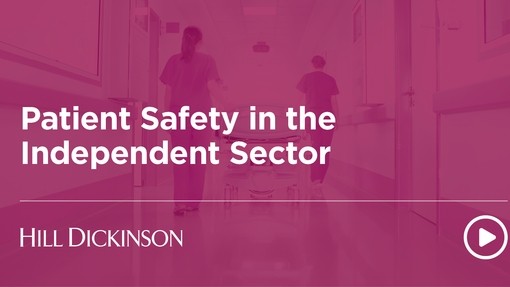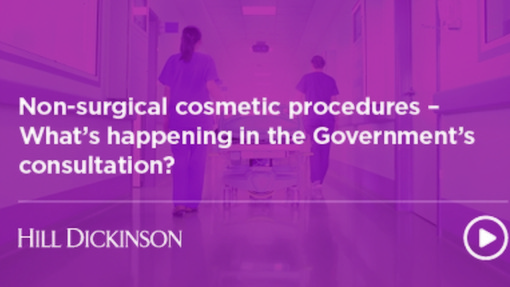Taking Liberties – first thoughts on the Liberty Protection Safeguards (LPS) Consultation for the independent health and care sector

Details
The draft Code of Practice for the Liberty Protection Safeguards – to replace the Deprivation of Liberty Safeguards (DoLS) - is now out for consultation until 7 July 2022. There will be lots to read and digest, but here are some first thoughts:
It is actually happening! Since the legislation was passed in May 2019, we have been saying that we are just waiting for the draft Code of Practice and Regulations to put flesh on the bones. It is now clear that the government is committed to seeing through the reforms.
Timescale – the documents published do not confirm a target date.
But, we do know that the consultation will close by 7 July 2022, and that the government expects to take until ‘the winter’ of 2022/23 to consider the responses. It will then publish a final version of the Code of Practice and Regulations, which then needs to be laid before Parliament for 40 days. After that there needs to be regulations for the necessary training, and at least 6 months to plan for implementation.
This makes October 2023 the earliest plausible date for implementation, and April 2024, perhaps, more likely.
It is rooted in the MCA – the most important thing is to get the Mental Capacity Act right. And, to emphasise this, it is great that the old MCA Code of Practice (2009) has been updated and that it is rolled in together as a single document dealing with both the MCA and LPS. The only downside is that it now weighs in at a hefty 518 pages!
Definition of a DoL
Most fundamentally, in any system to protect Article 5 rights to liberty, what is to be regarded as a deprivation of liberty (DoL) to trigger the process?
Having committed to follow the acid test of the Supreme Court in Cheshire West (ie someone ‘under continuous supervision and control and not free to leave’), the government said that the code would offer some examples about its interpretation.
These are in Chapter 12, and they are likely to be controversial, in particular the approach taken to continuous supervision and control.
It is suggested, in both the text and in the case studies, that someone who is left to their own devices for substantial parts of their time is not likely to be under ‘continuous supervision and control’, though this seems to set the bar rather higher than the case law does.
Even though the code itself says, at paragraph 12.24, ‘it is very important to bear in mind that supervision and control should not be inappropriately downplayed as support’, several of the case studies described to not be a DoL look very like cases in which the court is currently routinely finding that there is a DoL.
We expect this to be a central issue for debate throughout the consultation (though the consultation question on this asks only if the guidance in Chapter 12 is ‘clear’, not if it is right, it is vital that you use the consultation to say what you think).
How should we define ‘objection’?
This is crucial because (aside from cases of DoL in independent hospital) access to an AMCP (ie an independent practitioner, as the Best Interests Assessor is currently under DoLS) for the pre-authorisation review stage is effectively dependent on whether the person is objecting. This is defined as:
- if it is reasonable to believe that the person does not wish to reside in the place that is proposed, [or]
- if it is reasonable to believe that the person does not wish to receive care or treatment in the place proposed
There is more guidance in paras 18.30-37 about the level of evidence needed to recognise an objection, and some examples are given.
Will the special scheme for care homes be reinstated?
When introduced to Parliament, the LPS scheme included special treatment for arrangements in care homes where, if they wished, the Responsible Body (the local authority or CCG for continuing healthcare funded placements) could ask the care home manager to do most of the heavy lifting for doing/arranging the LPS assessments and pre-authorisation review. It was the most controversial bit of the legislation, with an outcry about conflicts of interest in particular, and the government agreed not to implement it.
The LPS consultation questions (Q12) now explicitly canvass opinion whether the care home manager scheme should be reinstated, so that may yet be back in play.
Independent Sector role generally
The reforms will reach across the independent health and care sector much more broadly than just in care homes.
Domiciliary care providers will need to be alert to the possibility of an LPS authorisation for someone in their own home/supported living, where DoLS did not previously apply (and, in practice, the obligation for any DoL in the family home to be referred to the Court of Protection for authorisation was not always rigorously met).
Independent hospitals are treated differently than NHS providers. Where a patient is deprived of their liberty in an NHS Hospital, the NHS trust is the responsible body for the purposes of an authorisation under the LPS. An independent hospital will not be a responsible body, and all its LPS authorisations will fall to the local authority.
On the other hand, for an independent hospital case, the pre-authorisation review stage of the LPS process must be carried out by an AMCP (as above).
Finally, there will be a lot to think about for providers involved with care of children and young people, as LPS will extend to 16 and 17 year olds, including all settings such as schools and children’s homes, as well as domestic settings.
What level of training is needed?
The documents published include a detailed training strategy.
Different roles are identified from the broad base of the triangle at level A (all health and social care staff) up to the top at level F (the new Approved Mental Capacity Practitioner role), with an accumulating learning content prescribed for each.
Even the general awareness raising for level A includes very detailed and substantial material to cover. Training, of course, will be key, and it is recognised that training will continue long after the initial implementation.
Will there be timescales?
Though it is not in the legislation, the code says that the assessments process, from triggering the process to a decision being made as to whether to authorise the arrangements should not exceed 21 days, save in ‘exceptional circumstances’ (para 13.26). It remains to be seen whether that is realistic.
What about the DoLS backlog as at LPS implementation?
Under the regulations dealing with the transition (Reg 7), a DoLS referral made but unprocessed as at LPS implementation day ‘is to be treated on and after the operative day as a request for arrangements to be authorised in relation to the cared for person’ under LPS.
We would understand this to mean that no fresh LPS application is required for the unprocessed DoLS referrals as at LPS implementation. But there is no detail about how that will work, and whether the LPS system (with different assessments and processes) will have everything it needs to work with from an old DoLS referral.
There is no explicit funding or provision to help clear the unprocessed DoLS before the LPS implementation.
Consultation questions
Though the 25 consultation questions are fairly narrow, often asking only if the policy set out is clear, not whether it is right, clearly it is vital that we each engage with and respond to the consultation, to ensure that the end result is as strong as possible.
Changes to the MCA code of practice and implementation of the LPS
Please contact us on LPS@Hilldickinson.com to sign up for our regular events and updates.






